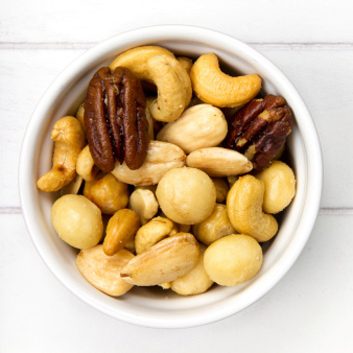The truth about good fats and bad fats
Registered dietitian Sue Mah unravels the confusing subject of fat

Source: Best Health magazine, May 2014; Images: Thinkstock
I love talking about fat. Why? Because it is a fascinating and complex nutrient that has been put through the wringer. Once deemed unhealthy for our hearts, all fats were a big dietary no-no. Today we know that eating the right types of fat is actually good ‘ and necessary ‘ for your health. Here’s what you need to know about getting more of the healthy fats, and keeping the unhealthy ones off your plate.
Unsaturated fats
These lower your "bad" LDL (low-density lipoprotein) blood cholesterol levels, and may even help guard against Parkinson’s disease. There are two kinds of unsaturated fats: monounsaturated fat (found in foods such as avocados, nuts and olive oil), which may help with weight control; and polyunsaturated fat (found in foods such as sunflower oil, corn oil, flax and fatty fish), which can help reduce your risk of heart disease. Omega-3 fat, a certain type of polyunsaturated fat, benefits your brain and heart health.
Canada’s Food Guide recommends including 30 to 45 millilitres (two to three tablespoons) of unsaturated fat every day in your diet. This could be a little olive oil that you use to make a salad dressing, a smear of mayonnaise in your sandwich, or soft margarine dabbed on toast or veggies.
A word of caution when it comes to margarine: Use soft margarine (usually found in tub containers), not a hard type. Soft margarines are made from healthy oils such as canola, olive and sunflower. Choose a product that says non-hydrogenated (meaning it contains no trans fat ‘ more on that later) and low in saturated fat on its label. Steer clear of hard margarines (they will usually come in a block, similar to butter), because they are mainly composed of saturated and trans fat.
Saturated and trans fats
Saturated fat is found in butter, lard, shortening, red meat, poultry skin and full-fat milk products. According to Health Canada, saturated fats tend to raise "bad" LDL cholesterol levels, which in turn can raise your chances of developing heart disease. However, research in the American Journal of Clinical Nutrition suggests that saturated fat may not actually be linked to heart disease after all. (Editor’s note: We will keep you posted if Health Canada changes its recommendations as a result; the scientific review process is long.) Furthermore, coconut oil (which is mostly saturated fat) may even help to raise "good" HDL (high-density lipoprotein) cholesterol. Confusing? Indeed! My advice is that you limit foods that contain saturated fat.
Then there are trans fats, which have a double whammy effect’ they raise "bad" cholesterol and lower "good" cholesterol. Here’s the catch (remember I said that fat was a complex nutrient?): The types of trans fats that have this harmful effect are not the naturally occurring ones such as those found in beef, lamb and dairy products, but those produced from partially hydrogenated oils, a common ingredient in many deep-fried foods and store-bought baked goods. That’s why it’s so important to read food labels and look for those that contain zero trans fat.
So what’s my advice when it comes to fat?
Don’t cut healthy fats from your diet. Enjoy meals made with them; snack on nuts and seeds for a good mix of monounsaturated and polyunsaturated fats; and eat fish at least twice a week’ especially fatty fish such as salmon, herring and trout’ to get omega-3 fats. Finally, choose lean cuts of meat with little marbling, and go for lower-fat milk products.
This article was originally titled "Good fats, bad fats" in the May 2014 issue of Best Health. Subscribe today to get the full Best Health experience’and never miss an issue!




